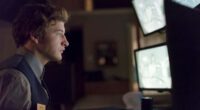2006 was one of the biggest years in the world of fashion in media. It was the year when The Devil Wears Prada made the leap from the written page to the big screen, and ABC premiered the American adaptation of Ugly Betty. Throughout time there have been numerous films and television shows with fashion at their core. However, 2000 should have been a big year for fashion films due to the Sundance indie darling Intern. The movie centers on a young woman who works for a glossy fashion magazine called Skirt. She is regularly the subject of horrid treatment and forced to do demeaning tasks but she wouldn’t trade it for anything else in the world. However, she is tasked with finding a spy (throughout the film, the characters use the word ‘yuri’) who has been leaking the magazine’s layouts to Vogue.
Intern is a movie unlike most because, at its center, it’s about proving yourself without having to betray anyone. Much like the 2009 classic Easy A, Intern centers on the outcast and not as much on those who are struggling to fit in as well as taking control of your destiny. The film features a great cast of Dominique Swain as the eponymous intern, Jocelyn Bennett. Supporting characters are played by Peggy Lipton, Paulina Porizkova, Kathy Griffin, Billy Porter, and Joan Rivers play larger than life editors at Skirt. The film also features cameos from fashion heavyweights like Tommy Hilfiger, Diane von Furstenburg, Kenneth Cole and, legendary editor-at-large of Vogue, Andre Leon Talley.
I got a chance to speak with Michael Lange, who directed Intern, and Jill Kargman, who co-wrote the script with Caroline Doyle, to get an inside look at how this film came and went without anyone noticing.
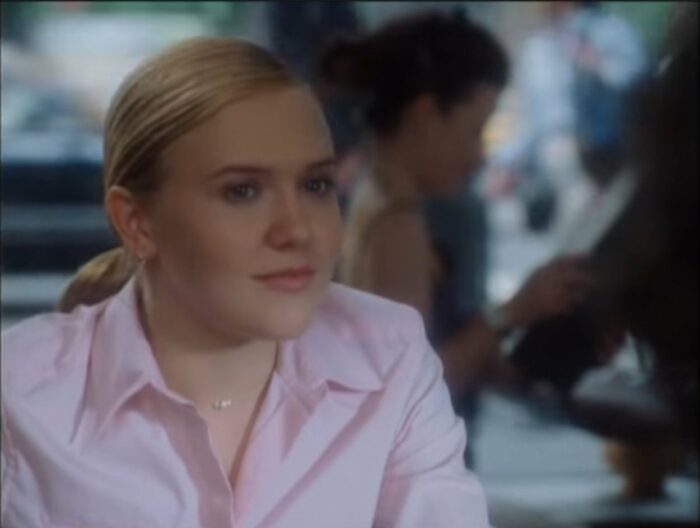
EJV: How did the idea for Intern come about?
Jill Kargman: Well, Carrie [Caroline Doyle] and I both worked at Harper’s Bazaar. But I actually had a really positive experience at Harper’s Bazaar. I had kind of butt heads with a couple of editors. It was in my head like a prototype to The Devil Wears Prada because we didn’t work for Anna [Wintour]. But we just worked for other editors who were just as harsh as the character in The Devil Wears Prada, but we’re lower down, which is almost worse in a way because when you’re not working for an editor-in-chief like at least you could justify getting walked on by Miranda Priestly cause she’s this goddess in the fashion world whereas we were just like working for random editors. And, that’s sort of part of paying your dues, I guess as Gen Xers was kind of being mistreated at a magazine. Now, I don’t think stuff like that goes down, but we were definitely you know, eating shit for a couple of years.
I started at Interview magazine, and then you know a bunch of us went out one night to Balthazar’s are much like in the movie The Devil Wears Prada. In fact, we’re like they all meet up like the young kids with different jobs. And Carrie and I had everyone laughing because we’re telling them stories about bosses and you know, all the crazy shit they said to us and people were like, ‘you have to write this’. This is a movie. So we basically did. We were both living at home. I was living with my parents, and she was living with her parents. We wrote it on her parent’s dining room table. So it was pretty cool and guerilla-style renegade. And then I said to Carrie, “You know, I have a friend of a friend, who’s a movie producer, why don’t I send it to her for feedback?” So I sent it to her right before Thanksgiving and on Thanksgiving Day, we had an answering machine, there were no cell phones, and she left a message on my machine saying, “Not only do I not have notes, but I also want to make this movie”. So it was all really like a quick fast turnaround. We went into production six months later. It was kind of a bumpy thing for us because we never got paid. So, we had no income, but it was definitely like the launchpad that we needed and helped us get agents and stuff like that.
Michael Lange: Jill Kargman and Caroline Doyle they had been friends for a while and they had both been interns in the fashion industry. So, they decided they wanted to write something about their experiences, so they kind of put it together. Then, Galt Niederhoffer, who was the producer, called my agent at the time, but she didn’t want me. She wanted Tommy Schlamme to direct it because she felt that his sensibility would be great for the movie. But Tommy was not available and so my agent called me and asked, “would you be interested in doing this script”, and it seemed pretty cool to me. So that’s how it got started.
I met with Galt, she came out to L.A. and we met at the Chateau Marmont on Sunset, which is this old school Hollywood, ‘if the walls could talk’ hotels. Anyway, we met there and we hit it off pretty well. I had quite a few changes because I think the original script was 65 or 75 pages at the most. I felt it was sort of an amusing montage of individual stories, but it didn’t really feel like it held together in terms of a script. It just needed more substance to it, so I worked with the writers for a couple of months and came up with a through story, which was the espionage element. That was not in the original script. I got the job because I was available.
That was a point in my career I had not done a feature yet. I had the fairly typical TV director; what I call feature fever, I don’t think I’m the only one that calls it that. I had read a couple of movies that did not interest me just because they were just horrible. A lot of it was it had a nice sort of quality of fun, it wasn’t too heavy, it didn’t take so at all seriously, which I liked. It was a romantic comedy which I’m sort of weird in that I don’t necessarily enjoy going to see romantic comedies but I’m sort of driven to work on them. I mean the TV shows that I’ve done, in that feel to them, are always fun for me. But anyway, I think it just had a fun heart to it and I knew that they had done they had Dominique Swain lined up to be Jocelyn. So, I met her she was great. And, obviously, I was pretty blown away by her work in Lolita. But yeah, I think it was just the tone of the script, the storyline, and just the feel of it that sort of appealed to me. And I was shooting in New York. I’m from New York, so that was very appealing.

EJV: Whose idea was it to start the movie off with a musical number?
Jill: I am obsessed with musicals. Even when I was underage, I would sneak into Marie’s Crisis [Cafe] and belt Andrew Lloyd Webber at the piano with all the cute gay boys in New York and I just love that whole musical theater world. It felt like a community to me. I always wanted to be a part of and I just feel like everything’s better with the musical. And in fact, in the series finale of Odd Mom Out, my TV show, I ended it with a musical. When my television daughter gets her period, there’s a whole period of music so I actually have a little history of that from interning. You’re the only one who really knows that because people sort of thought it was left field he didn’t know me, but I always said guys, I’m obsessed with musicals; I want to write a musical. And what better way to like to do it then, like, have a full-tilt dance number in the aisle of Duane Reade with the tampons. But it does harken back to this in a way. We wanted to do it like a really high budget and I had a whole image of like Las Vegas showgirls coming out and this whole crazy thing. We couldn’t afford it so everything was on a shoestring. We called in favors, and it was like a friend of a friend who brought in the dancers, and we had to go streamline dance entire rather than Las Vegas headdresses which was going to be my preference. I wanted it like totally random, like Big Bird coming in. I wanted, like, just the craziest weirdest thing. That was obviously not within the cards.
Michael: Actually, it’s kind of a funny story because originally, the writers had one of their friends, who wrote the lyrics to it, but I was not happy with the music. So, I have a friend who I have been friends with since junior high school and I sent out the lyrics to him. I told him what I was looking for in terms of a feel. He wrote it over a couple of hours and sent them back and I loved it. It was good. And then, the unknown story of it is that he’d just done a demo of it with him singing all the parts, including the female parts. He was able to adjust his voice digitally so it sounded like a woman. When we were finally finishing the movie, he brought in a couple of female singers to do the woman parts and I didn’t like them as much. So the cut that ended up in the movie is him singing all the voices.
EJV: What were some, if any, changes made from the original script?
Michael: It was something that Jill and Carolyn and I bounced around, like what would be kind of a fun storyline that was still sort of light because we wanted the thing to be light and fun, but still have enough weight to it to feel like it was a little bit of an engine story-wise. That seemed like something that we could have fun with. It wasn’t that serious, but as I said, it was serious enough to make it feel like it had some importance to it. I think at the time there were some stories going on and in other industries of corporate espionage and I mean, there still is, but I think there were a few articles that had come out at the time. I can’t remember the companies but I think it was a little bit inspired by that.
EJV: Why add the spy angle to a satire/romantic comedy?
Jill: I think they had us beef up the whole yuri thing and elicit more of something that would have twists. Otherwise, they thought it was just too esoteric a milieu with this fashion world. And they wanted it to be more appealing to people by creating some kind of plot that the protagonist gets ensnared in. We just kind of beefed that up, and the movie, No Way Out was big around my teen years so we wanted to do a spoof of a CIA movie, but put in the fashion world. It was just so weird. I don’t even know what we’re thinking really. But we wanted to satisfy people’s notes about it. So we just drew that plot out. I mean, I was content just doing little tidbits in the fashion world.
EJV: Who did you base some of the larger than life characters seen throughout the film on?
Jill: It’s so funny. That is actually not that big of an exaggeration from meetings that we sat in on. I mean, there would be editors coming back from Fashion Week crying and like dabbing tears and weeping, saying it was so beautiful. The theme was mental asylum from 1961 to 1963. And they were dead serious. We would just laugh, and in fact, Gucci just sent straight jackets down the runway. So like you’re only exaggerating a little bit. I mean, everyone always says I exaggerate so much, but like, I really don’t think I do. It’s more like holding up a funhouse mirror to the fashion and editorial world. It’s not like it’s that exaggerated.
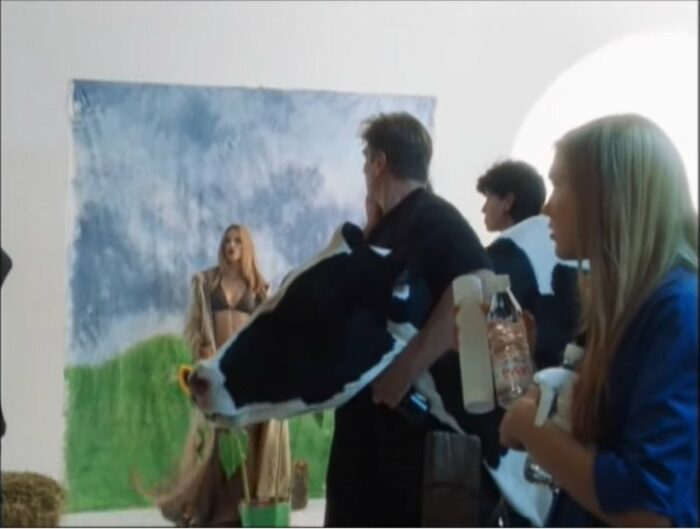
EJV: Were the characters tamer than their real-life counterparts.
Jill: We [Caroline and Jill] met, so many over the top people. I don’t even know if they exist like that anymore. I feel like now that there’s Instagram, there are ways that people can have a keyhole into your life. So, you don’t have to be larger than life in a way because you don’t know, you’re kind of giving everyone entree into your brain, I feel like back then there wasn’t really a way to get famous. There was no social media so people kind of became these characters. They were larger than life because they had to create a persona. Whereas now, everybody can be somebody, you know, through their own media. But this was more of like a buzz generator. So people were so over the top and funny.
One thing I’m really proud of is that Billy Porter is in this movie. And I remember at the time, saying if I could buy stock in people, I would buy stock in Billy Porter because I just thought he was so talented. And then the character Richard, who is a friend of ours, that the characters based on is actually a white guy, and we just heard him read and thought he was the best man for the job. We didn’t care that he was black. We just thought he was by far the best actor. And I’m so proud that he was in this movie because now he’s the icon that I knew he’d be.
Michael: In the beginning, and the party that becomes the Intern song, a lot of the people like the character that Billy Porter plays, are actually in that scene. He’s the one who comes in, in real life, he’s a white guy. And he’s like, he comes in and says something nasty to someone, and he’s dressed in all black. I can’t remember what the line is. But so he was great. The funny thing is that I met most of the characters that the Intern characters are based on, and I can pretty much say, without exaggerating, that the real-life characters are maybe slightly bigger than the movie version characters—like Andre Leon Talley, who actually plays himself. The character that he plays in the movie is exactly him.
He actually called me, frantic one day, about a few days before we were going to film the scene where he comes into the hotel room. And he’s like, “Michael, I’m very concerned that the hotel room that you’ve selected is large enough for the jacket that I’ll be wearing because John Galliano has made this jacket for me that has a 20-yard train. So I said, and I’m thinking 20 yards, that’s 60 feet. So I’m thinking he must have been so upset that he made 20 feet. So I said, “Oh, you mean 20 feet”. He said, “No darling. If I meant 20 feet I would say 20 feet. It’s 20 yards. And I said, “Well, Andre, it’s a hotel room we’re shooting it is. We don’t have a hotel room that’s 60 feet long.”
We ended up having my assistant, who was actually Jill Kargman’s brother, Will, carrying the training behind Andre because it was way too long for the room.
EJV: How did such a star-studded cast come together for this film?
Michael: At the time, because Caroline and Jill were both sort of in the fashion industry and Jill’s father was, and I think still is, the chairman of Chanel, Harry Kopelman, the movie got quite a bit of buzz in the fashion industry. We were pretty inundated by people who wanted cameos. In terms of the actual parts, we all had ideas about who would be good for what parts. They’d been friends with Gwynyth Paltrow, Jill and Caroline, they all went to Spence school together. It was pretty exciting; I still have the call sheet from that day up on my wall in my office. Not very many people get to have a call sheet with Gwenyth Paltrow on it. Then we did auditions just like normal. Like I said, with the other parts, we made offers. And, again, I think because it had quite a bit of buzz in the fashion industry, people were interested in being in it, so that helped us quite a bit. The cast was a lot of fun, I mean, Joan Rivers was a total joy to work with. We got along great. Paulina Porizkova was amazing. All of them, it was a great cast. It was no Joker.
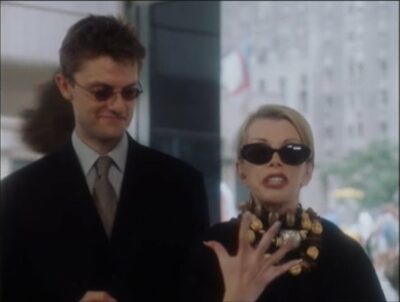
EJV: Was there ever an attempt to get Anna Wintour to cameo?
Michael: We tried, but she was not. I mean, she didn’t not like the movie. But, she did not want to be involved in it. It wasn’t a negative thing. It just really feels like it was something that would be appropriate for her to be involved with.
Jill: No, I don’t think we had the balls. I think we knew that it would just never happen. And, Andre was at Vogue at the time, and so I felt like we had the bases covered with Cathy Horan from The New York Times. I felt like there were enough people. We also liked the idea of her mystery. I now know her a little bit, not well, but she still seems mysterious. I liked that it was kind of shrouded in secrecy. We didn’t even attempt.
EJV: What were some of the difficulties and challenges associated with bringing this film to fruition?
Michael: Creatively, it was really not that challenging to get it all to work because I think the script was pretty good. It was cast well; that part was pretty good. Production-wise, it was a challenge for me because most of my work up until then and since then has been on television, where you come into the show, and the infrastructure is already there. All I have to worry about it directing, whereas, with a big-budget movie, or even a small budget movie, you have to really start everything from scratch. Also because, it was a low budget, so we are not really able to attract, you know, the top people in the business. So, the crew was not what I was used to working with. Although they were mostly enthusiastic, it was a pretty light crew, and that was sort of the biggest challenge for me was really just getting the crew to sort of come up to the level of expectation that I had for the work. Luckily, I was able to hire a DP [Director of Photography] who’s a guy I had worked with professionally out here in L.A., Rodney Charters. He and I were able to really sort of get everyone up to speed and, you know, get them to pretty much do what we were looking for. Even on a big show, it’s hard to shoot in New York. So on our little show, it was pretty difficult to film on the streets of Manhattan. The biggest challenges for the movie were production-wise, just because I think they were not used to working to the level that I was interested in working.
Jill: As a writer, I will say like we were the lowest people on the totem pole. Once Michael was brought on, it’s kind of his movie. The producers and I just felt because we’re such newbies, and we were so young. I’m 45 now; I was 24 when this was being filmed. I felt like I had no power. We were just kind of shoved down the side and, Michael, whenever we would kind of chirp in he, was lovely and always so nice, but at one point, to The Doors song, “Riders on the Storm”, he would go, “Writers on the set. Into your face, they get.” I was like, “okay, I guess we’re supposed to just kind of shut up”, which is true. The only reason why I felt so entitled to pipe up, which is different from other film writers is that we helped secure locations, all of those cameos, certain clothing and things like that. I felt like because we were associate producers, which meant nothing because we never got one dollar. In fact, we like lost money because we sent flowers to all of our friends, who were connections. We kind of like hemorrhaged money instead of making money but I felt entitled to chime in and say, “oh, by the way, Michael, you pay the cab from the inside of the cab, not the outside of the cab”. Certain New York details. So that was a challenge; feeling like I was supposed to know my place, but I also wanted it done right.
EJV: Who thought up the twist ending where the Yuri is revealed?
Michael: Yes, we were hoping that people would be fooled and then surprised. And I loved her whole, her reasoning for doing it was amazing. I thought ‘it’s for the good of the industry’. So she had a great time with it. Actually, her big speech at the end, she wrote a good part of that or rewrote what Jill and Caroline originally had written.
Jill: I think we kind of honestly shoehorned that in later. I think we were keeping it mysterious. That was all part of like that subsequent plot that we had to kind of put in there to give it more of a hook. That was something. I think we were beginners as writers. I don’t even really remember how we brought it back to her. But there are all kinds of like weird behind the scenes intriguing things. I mean, you see that a bit The Devil Wears Prada when she’s getting Jacqueline to take on the other role. So, I mean, I do think some of that stuff goes on. But I don’t think it’s as sinister as in films.
EJV: What were some of the iconic moments throughout the filming process?
Michael: The most fun one for me was that in the end scene at the fountain in front of the Plaza Hotel that was pretty iconic from a New York City point of view, just the visual of it. I mean, I don’t know. That’s a good question. I haven’t really thought of it in terms of those. I think that would probably be it though. Because I thought the visual and you know, the music that went with it, the whole feeling even though you saw it coming. I mean, it’s one of those things where, in a movie, I think if you see something coming. It’s not necessarily a bad thing. And I think in this case, especially a romantic comedy, I mean, everyone knows at the end, they’re going to get together. I think that was sort of a feel of it was good. Plus, it was the only crane shot in the movie. We couldn’t afford a crane on anything else. And of course, the one we got was awful. So if you look at it too closely, it’s a pretty crappy crane shot. But don’t tell anyone and I won’t either. Just don’t look at the edges of the frame. That’s where I always look on crane shots, and that’s where it’s, that’s the giveaway. If you look at the edges of the frame, and they’re jiggling, you know, it’s bad.
EJV: What was it like to work with Andre Leon Talley?
Michael: Yep, exactly. And then he was wearing this gigantic Emerald necklace. That’s a real Emerald necklace. I can’t remember how much it weighed, but it’s worth $3 million. They had two armed guards that came with him that day because it was loaned to him by some jewelry company. That was pretty crazy too. And the wardrobe. I mean, the wardrobe. We got most of the wardrobe from Chanel. And the wardrobe alone was probably three times what the budget of the movie was. We got it all for free.
Jill: I’ve known Andre since I was 10. He’s fabulous. He’s an icon in fashion, and I just love him and that was just an ask. I think people are generally flattered when you say, “I worship you and with everything you do.” I always want handwritten notes and basically begged and said, You know, you’re such an icon. We would be so honored and I just basically gushed. Simon Doonan said yes, Andre said yes, Cathryn Horan said yes, Gwyneth went to school with us [Jill & Caroline]. It’s funny; it didn’t seem like a huge favor or anything even though of course. Now I realize maybe it was, but people just seemed so excited and really nice and ready to hop on board. But it was really amazing.
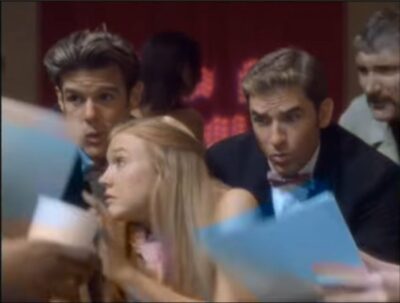
EJV: How did it feel to see the finished product premiere at Sundance?
Michael: It was a peak experience, and I highly recommend it. There’s not going to be an experience that a director can have that’s better than having a film in the Sundance Film Festival unless it bombs, I guess. As I said, all of my work up until then was in TV, so you sit at home knowing that millions of people are watching it, but you don’t really get the feedback. To sit in a theater with a couple of hundred people or whatever, it was in one of the larger venues there, I think it was maybe 500 seats or something, and just hear them laugh at all the right places; just enjoying the movie. It was pretty exciting. And then the audiences were sold out. We had four screenings and each one of them was completely sold out. You know, and I’d be riding around on those little buses that are in Park City and, hearing people talking about it, they didn’t know who I was, it’s pretty cool. Forget pretty cool; it was amazingly cool.
Jill: I’m going to be honest with you. I was not thrilled at Sundance. First of all, I was in a bad mood, I lost my luggage, but we had watched an earlier cut and went to go meet with the producers to just give notes. A lot of it was music that I wanted and just different edits that I thought. I think I have ADD and I wanted it much more fast-paced. I’m from that MTV generation of the 1980s where I like everything moving with forward-propulsion, rock and roll over it and I just wanted it to be sexy. And they just couldn’t afford the music that I wanted or that extra time in the editing bay. When I saw it, I realized they actually didn’t incorporate our notes and I was kind of disappointed, but I lost perspective. So, I don’t know. I was delighted that people enjoyed it and when I heard that there was a tradition in the dorm at F.I.T. [Fashion Institute of Technology] to watch it for a whole bunch of years I was stunned. People said, “All the fit incoming class, they all sit and watch it at midnight the first week of school or something.” I was delighted because I felt like what can be cooler than having young fashion students look at this. I’m sure we’ve been eclipsed by The Devil Wears Prada, which I think is a better movie but I did feel like we had our little baby cult-following and I was very honored.
EJV: What happened to the film after it was critically lauded at Sundance?
Michael: It was actually released for two weeks at the Angelika Theater in Manhattan. It was released there, did really well, again, packed audiences. I wasn’t able to go to see it, but I heard you know, great reports on it. But it turns out that this the distributor, in order to finance it, had pre-sold the rights to TV in Europe. Movie distributors were not that interested in spending all the money it takes to get a movie distributed, especially back then when it all was filmed, if it was going to be on TV soon afterward. That was a part of the problem. And I think the guy who financed it, I heard through the grapevine that he doubled his money before we even finished shooting the movie by selling it to European TV. So, that was kind of upsetting.
EJV: Why didn’t this ever become a well-known fashion film like Robert Altman’s Ready To Wear (also known as Pret-A-Porter), or The Devil Wears Prada.
Michael: Actually, when I saw The Devil Wears Prada, I became infuriated. In fact, although The Devil Wears Prada is based on a book that was written I’m pretty sure before Intern was done. Nevertheless, the character that gets fired in the beginning; her name is Jocelyn. And when I heard that I was like, this is really annoying. They fired Jocelyn, who was the main character Intern so someone knew about this the movie. I mean, it seemed like the kind of movie that could have done pretty well in theaters. It ran on HBO for a couple of years and did well there.
EJV: Would you consider doing a remake or a re-release of Intern?
Michael: I think at this point I mean, I think the rights are owned by… I don’t even who they’re owned by anymore, so in terms of releasing it, that’s really not up to me. I don’t really have any ownership participation in it. I mean, it would be fun to remake it, but, I think people are gonna say well, why we make it we have The Devil Wears Prada is so close. So yeah, that’s a good point.
Jill: I haven’t because I really feel like in a way it’s kind of obsolete. It was like a moment in time because I feel like The Devil Wears Prada came along and conveyed that world with such a higher budget and such a better sexier flash to it. I don’t know; I love that movie. I really think it’s a perfect movie. I remember watching it being like, “Yup, this is kind of what we were trying to do.” But we had no money. I feel like if I tried to remake it, it will kind of have no point, and I also feel like I scratched that itch at that time. Now I’m on to different things. When I did my show, it was three years, that was kind of reflecting motherhood and that point where I was then like. I try to really write what I’m steeped in.
EJV: What were some of the lessons learned after 20 years?
Michael: I think probably the thing the biggest loss that we have had in those 20 years is innocence. Because that movie had sort of a nice innocent quality to it, and I think movies today do not have that. In fact, I did a pilot for a television show last summer and it did have that feeling which is kind of what attracted me to the project. And we can’t get any headway on it at all because I think that’s the reason because the characters in Intern and in this pilot are all sort of good-hearted people with obviously with quirks, but it has a good heart to it. I think people are not looking for that anymore and I think that’s kind of sad. I still have my innocence though. Just you’ll be happy to know. I’m still Pollyanna.
EJV: What was the single most memorable moment from shooting the film?
Michael: The ballroom scene was great to shoot. Actually, I’m not good at picking out favorites to tell you the truth. Actually, the very first scene that we shot was the scene with Gwyneth and Andre at a restaurant in New York. I think it’s on 12th or 10th Street down in the village. That was pretty exciting. That was probably my I mean overall just that was that like, as I said that was the first scene we shot and to have Gwyneth Paltrow in the scene that you’re shooting. As a first-time feature director was pretty darn exciting. And she was great. I mean, she walked to the set. She lived right around there anyway, so she walked in. She just introduced herself to me, as if she needed an introduction. And I was pretty exciting. But I mean, there were a lot of really fun moments in it. The fashion show with the rain—we shot that across the river in Queens. That was a lot of fun.
Jill: I would say my favorite is the Billy Porter stuff. It just thinks he’s so funny. As I said, I remember that I just thought he was a star on that set. I thought he was just a next-level talent. And I’m so glad that the world caught up with me.
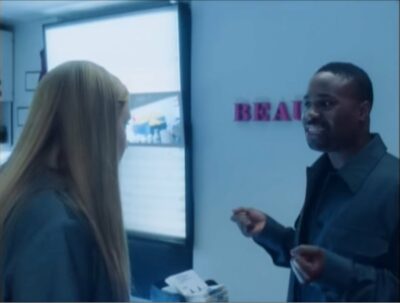
EJV: What were some behind the scenes tidbits from the film?
Jill: There’s a party scene in a room that no longer exists in New York. It was a spectacular press room that Chanel had and my dad worked there. So we filmed it there and now that’s gone. Now. it’s part of the Chanel boutique, but it used to have these amazing Coromandel screens and antiques. That’s now gone, sadly.
Joan Rivers showed up to the first table read totally purple with bandages on her face because she was getting some plastic surgery procedure and her doctor thought he was doing her a favor. And as a gift, he gave her an acid peel while she was under so he thought that she would be happy with that. But, she didn’t tell him that she had a table read, so she was really embarrassed to come to the table read like looking kind of like a monster, but I loved her. I became friendly with her and really, really just adored her. She had since become friendly with my parents and had said, “What a joy it was to do that role”. I was so touched, she couldn’t have been lovelier. That was a bummer. She came to the table reads like literally dressed like a zombie with gauze.
EJV: What is it like to look back on this film?
Michael: You know, it would be great to get the movie released. As I said, it’s fun to reminisce about the movie. So it was definitely a peak experience for me. So that was good.
Jill: Even though at the time, I was lamenting that I never got paid and I didn’t have much control I just want to add that I know how lucky I was that it got made. And that all these fabulous people are in it and it was the best way to watch you know, my writing career. I really feel like I learned so much. It was kind of a crash course; it was my version of film school. I don’t want to be a director, but as a writer, I learned so much stuff that I pulled on for Odd Mom Out and resourcefulness and all that stuff. It was an education, and I feel really lucky that it was even made. I feel even luckier that people like you watched it and are they interested in celebrating its anniversary, which is a lovely surprise.


